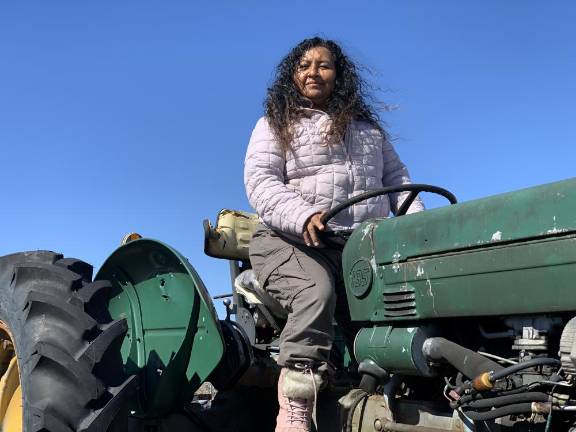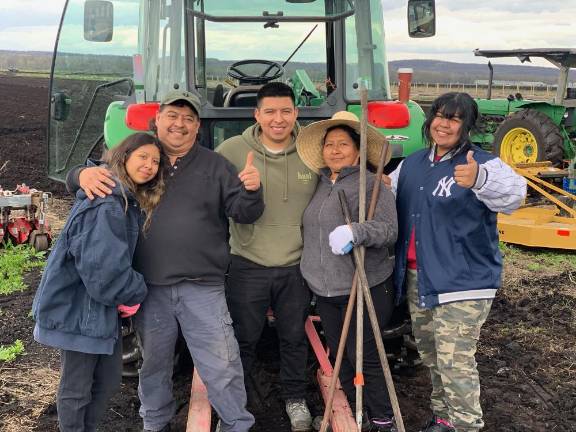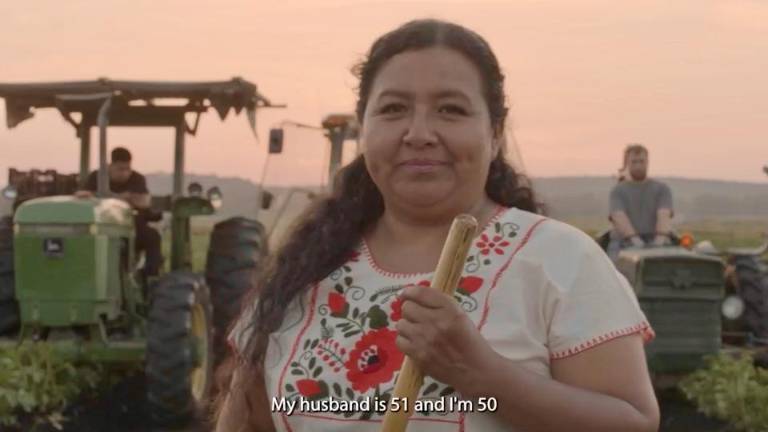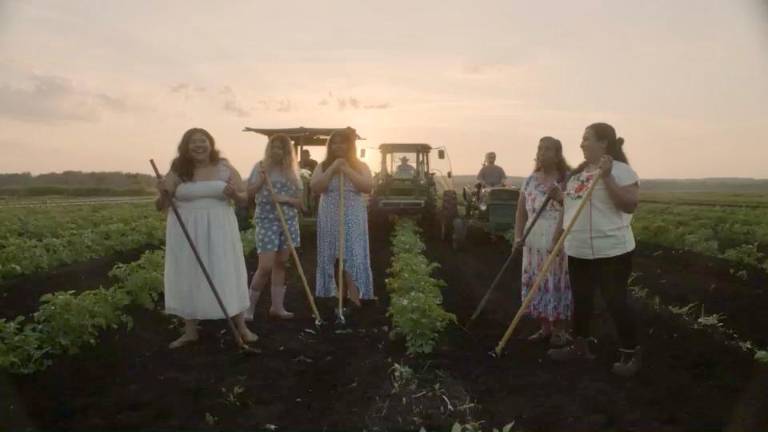‘Like a magnet’: she felt the pull of the black dirt
How a 4-foot-10 mother of four busted barriers to get her family back onto the land




Translation assistance from Crystal Pereira and Noereem Zenaida Mena
Ana Isabel Rodriguez Angel recalls her favorite food memory: pumpkin blossoms with epazote zucchini. As she answers my questions in Spanish, I can hear Ana’s mind wandering back to her native Progreso, Mexico. Her daughter, Jennifer, hums along lovingly to her mother’s trip down memory lane.
That Ana owns Angel Family Farm, which produces 60 varieties of vegetables on 14 acres of black dirt in Goshen, NY, might seem natural enough. Her life now bears a strong resemblance, after all, to the way she grew up: in a farming family, on an organic farm – before there was any such word in the local lexicon. But her path to becoming a second-generation farmer was anything but straightforward. The prevailing culture of machismo in Mexico meant that Ana’s deep-seated desire to live the finca (farm) life came up hard against a “muchachos only” culture.
Arriving as immigrants in Brooklyn, NY, in the 1980s, Ana and her husband, Chrisostomo “Fily” Angel, worked all sorts of jobs, including running a taco stand, to help raise their four kids. All the while, Ana held firm to her “immense wish.” The Angels often drove past Goshen on their way to visit family in Middletown. Ana could see that the soil was “rico” – rich.
That piece of earth “was like a magnet,” said Ana, “pulling me, and I was going straight to her.”
Lizbeth, the Angels’ eldest daughter, describes her mother’s ambition as a “calling.” “I can’t explain it, it was in her,” she said. “I think it was fate.”
And as fate would have it, they saw an ad on TV around that time about the New Farmer Development Program (now called the Beginning Farmer Program). Created by the nonprofit GrowNYC, the program helps aspiring farmers with agricultural experience, especially those from marginalized backgrounds, establish small-scale, sustainable farms. Ana was accepted in 2004, trained in organic techniques and given help with procuring seeds, soil and connections. Two years later, the Angels became a farm family – at least on weekends and in the summer, when they would drive up from Brooklyn to work their fields.
“I was 14, in ninth grade, and I thought my life was over when I was told we were going to spend our entire summer on the farm,” recalls Lizbeth. With no tractor or equipment, they had to do every bit of labor by hand. They slept in their van and used gas station restrooms. “I had to care for my three younger siblings while my parents were out in the field. It was hard,” said Lizbeth. In 2011, they appeared in the inaugural issue of Dirt, by which time they had two trucks, a tractor, and posts in the ground for a storage shed.
Now, sixteen years since that fateful summer, they have expanded from their initial focus on Mexican produce to include herbs and flowers for farmers markets and CSAs in New York City and New Jersey. “The best part about being a farmer is the lifelong relationships we have with our customers, especially the ones that have been with us since we started. They’re like family to us!” says Ana.
“My family — my whole family — loves agriculture, loves the land, loves nature, because it is something you are really born with. It is not something you learn over time,” said Ana. “The relationship between my land and I, we’re best friends. She loves me and I love her. It’s like we’re together all the time.”
But for Lizbeth, who was not born to the farm life, that love needed time and tending. Being the eldest and the only one who spoke English, a lot of responsibility fell on her young shoulders, at a time when what she wanted was to be hanging out with her friends in the city. “She was my boss because she spoke English,” said Ana. “She was the financier because she knew how to open an account at the bank. She had more roles.”
Lizbeth recalls those early years, too, as a time when “outsiders” didn’t receive the warmest of welcomes. “In 2021, you go out to Central Deli or any store in town and you see so many different people from all countries and backgrounds. In 2006, not so much,” she said. “We were often stopped by the same town sheriffs and asked the same questions about our vehicle and who we were. It’s so much better now.”
What trials the Angels faced, they met with a united front. “We try to focus on building on each other’s strengths and help each other out along the bumpy roads,” said Lizbeth. “I don’t know if it’s a Mexican thing or an Angel family thing but we have always been a tightknit family. It’s just the dynamic we have at home and it follows us everywhere.”
Lizbeth, now 30, still handles the money and customer relationships at the farm, and can see herself carrying on her mother’s legacy, as a third-generation farmer. Each of the siblings, in addition to off-farm jobs in the city, has a role in running the farm. “The two little ones who put seeds [in when they were younger] are the cashiers,” said Ana. “My husband is the driver. I am the product quality inspector. My son is the one who helps us load and unload the deliveries.”
Ana, 50, is not only an entrepreneur, but a fierce advocate for woman’s rights. “Being a woman and being a farmer was not easy 16 years ago,” she said. “But as a woman I never felt less than anyone. I always said, ‘this is a world for everyone.’ And having three daughters, women, gave me even more strength to continue fighting for the protection of work and for the protection of gender.”
“In 2012, when we finally managed to purchase a box truck, people would laugh when they would see my mom hop in and out of the truck,” said Lizbeth, proudly. “She’s four-foot-ten, driving what seemed to be a monster truck then. It’s been a journey.”